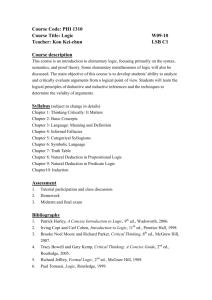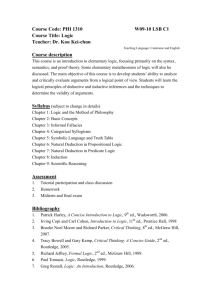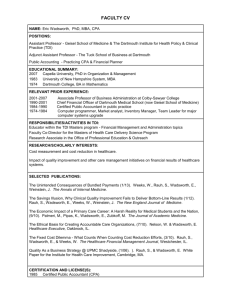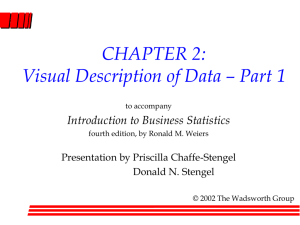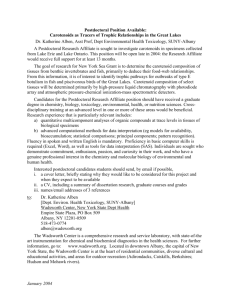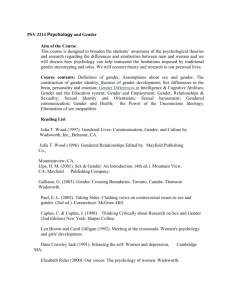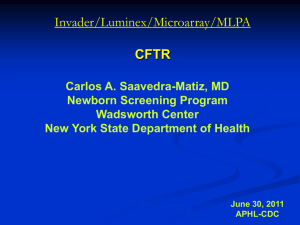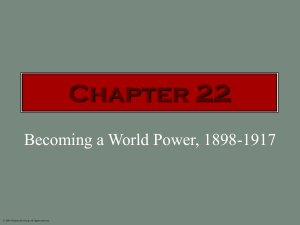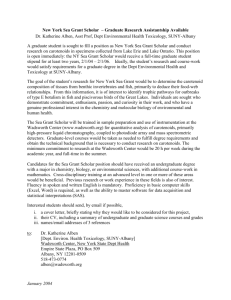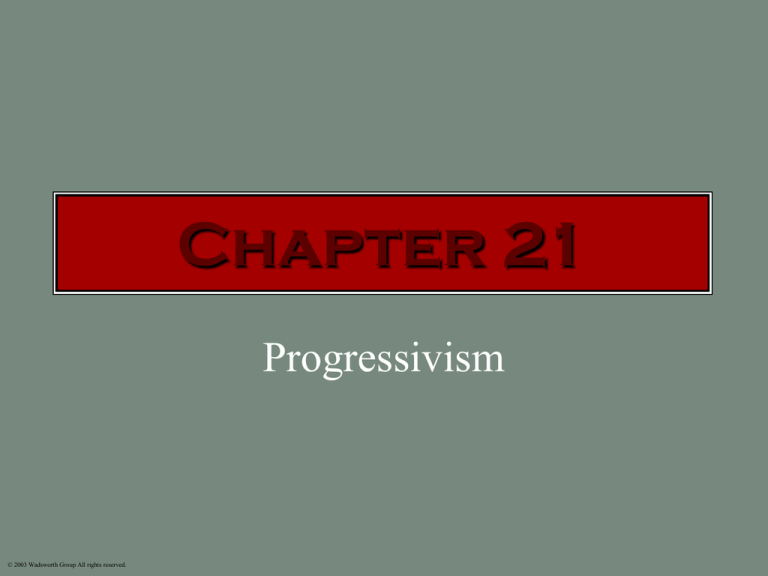
Chapter 21
Progressivism
© 2003 Wadsworth Group All rights reserved.
Progressivism and the Protestant
Spirit
• Progressivism strongest among middle class
Protestants
• William Jennings Bryan
• Billy Sunday
• Walter Rauschenbusch
– Social Gospel
• “Muckrakers”
(c) 2003 Wadsworth Group All rights reserved
Muckrakers, Magazines, and the
Turn Toward “Realism”
•
•
•
•
•
“Muckrakers"
Ida Tarbell
Lincoln Steffans
George Kibbe Turner
Muckraking reflected
– Expanded newspaper circulation
– Increased interest in “realism”
(c) 2003 Wadsworth Group All rights reserved
Increased Newspaper and
Magazine Circulation
• Newspaper readership increased 8 fold 1870-1909
• McClure's Magazine
– Sam McClure
•
•
•
•
Ladies Home Journal
Harper’s
The Atlantic Monthly
More talented people attracted as more wealth is
in journalism industry
(c) 2003 Wadsworth Group All rights reserved
Circulation of Daily Newspapers and Magazines, 1880-1919
(c) 2003 Wadsworth Group All rights reserved
The Turn Toward “Realism”
• A way of thinking that valued detachment,
objectivity, and skepticism
– Muckrakers
• Attempts at creating truer, realistic ways to
represent and analyze American society
• Increasing interest in social, political and
economic reforms
• Progressivism centered on abuses exposed by
Muckrakers
(c) 2003 Wadsworth Group All rights reserved
Settlement Houses and Women’s
Activism
• Settlement Houses:
– Established to assist poor (immigrants) with
city life
– A movement inspired mainly by young, middle
class, educated, Protestant women
– Sensitivity to social injustices
– Rebelled against relegated solely to roles of
wife and mother
(c) 2003 Wadsworth Group All rights reserved
Hull House
• Jane Addams and Ellen Gates Starr
• Nurseries and other help to working
mothers
• Provided cultural events
• Florence Kelley
• University of Chicago Department of Social
Research: 1st school of Social Work
• Hull House widely copied, over 400
settlement houses nationwide
(c) 2003 Wadsworth Group All rights reserved
The Cultural Conservatism of
Progressive Reformers
• Settlement house workers generally more
sympathetic to immigrants than others
• Uncomfortable with emerging sexual
revolution
– Mann Act
• Women's Christian Temperance Union
• Anti-Saloon League
• Ignored community role of saloons
(c) 2003 Wadsworth Group All rights reserved
A Nation of Clubwomen
• Growth of local women’s clubs
• Assumed tasks of social reform
• Made traditional female concerns matters of
public policy
• Black clubwomen
• Perspectives on alcoholism and sexuality
(c) 2003 Wadsworth Group All rights reserved
Socialism and Progressivism
• Socialism government operation of
economic institutions keeps wealthy elite
from controlling society
• Socialist Party of America
– Eugene V. Debs
• Appeal to Reason
• Upton Sinclair
– The Jungle (1906)
(c) 2003 Wadsworth Group All rights reserved
The Many Faces of Socialism
• Diversity of Socialists
– Immigrants
– Native-born farmers and miners in the west
• IWW most radical Socialist group
• Eugene V. Debs and mainstream Socialists
• Victor Berger and Evolutionary Socialists
(c) 2003 Wadsworth Group All rights reserved
Socialists and Progressives
• Progressives and Socialists both assume the state
can solve economic abuses
• Great deal of cooperation
– Progressive lawyer Clarencve Darrow defended
Socialist Big Bill Haywood
– John Dewey, Thorstein Veblen, Helen Keller dabbled in
Socialism
• Progressives frightened by Socialist talk of
revolution
(c) 2003 Wadsworth Group All rights reserved
Municipal Reform
• Progressives wanted public ownership of
private monopolies providing city services
• Hazen S. Pingree
• Carter Harrison, Jr.
• Tom Johnson
• City Commission and City manager
government
(c) 2003 Wadsworth Group All rights reserved
The City Commission Plan
• Galveston, Texas (1900)
• Shifted municipal power from the mayor to
5 city commissioners
• Each commissioner was responsible for a
different department of city government
(c) 2003 Wadsworth Group All rights reserved
The City Manager Plan
• Sumter, South Carolina (1911)
• City Manager Plan constructed to overcome
failures or corruption of the commissioners
• Commissioners continued to set policy
• City Manager was appointed to curtail
special agendas
(c) 2003 Wadsworth Group All rights reserved
The Costs of Reform
• Dissatisfaction with some municipal reforms
– Poor and minority voters felt their influence in
local affairs was weakened by the shift to city
commissioners and managers
– Citywide election diluted immigrant and working
class vote
(c) 2003 Wadsworth Group All rights reserved
Political Reform in the States
• Reform in the cities spread quickly to
reform at the state level
– State government officials also experienced
corruption and incompetence
– Power of lobbyists
(c) 2003 Wadsworth Group All rights reserved
Restoring Sovereignty to “The
People”
• Direct primary
• Seventeenth Amendment (1913)
– Mandated direct election of Senators
•
•
•
•
Initiative
Referendum
Recall
Campaign contribution limits
(c) 2003 Wadsworth Group All rights reserved
Creating a Virtuous Electorate
• Progressive reformers worked to create
responsible electorate who
– Understood the importance of the vote
– Resisted manipulation of the electorate
• They also sought to keep the vote from citizens
considered corruptible and irresponsible
• Paradox: electorate enlarged to include women,
but harder for minorities and poor to vote
(c) 2003 Wadsworth Group All rights reserved
The Australian Ballot
• Up until 1890, public voting existed
– Vulnerable to corruption, bribery, forces of
persuasion at the ballots
– One-party ballots
• 1890: Australian ballot provided for private
voting, with choices among the parties
(c) 2003 Wadsworth Group All rights reserved
Personal Registration Laws
• 1890-1920: almost every state passed
these laws
• Called for voters to register and provide
proper identification
• Issues with registration
– Made it harder for poor to vote
(c) 2003 Wadsworth Group All rights reserved
Disfranchisement
•
•
•
•
•
•
Immigrants must become citizens to vote
Bureau of Immigration and Naturalization
literacy test
property qualifications
poll tax
National Association for the Advancement
of Colored People (NAACP)
(c) 2003 Wadsworth Group All rights reserved
Voter Participation in 13 Southern States, 1876, 1892, 1900, 1912
(c) 2003 Wadsworth Group All rights reserved
Disillusionment with the
Electorate
• Walter Lippmann
– Drift and Mastery (1914)
• Voter participation rates fall from 79% in
1896 to 49% in 1920
(c) 2003 Wadsworth Group All rights reserved
Voter Participation in Presidential Elections, 1876-1920
(c) 2003 Wadsworth Group All rights reserved
Woman Suffrage
• National American Woman Suffrage Association
(NAWSA)
– Elizabeth Cady Stanton
– Susan B. Anthony
– Carrie Chapman Catt
• Western states 1st to grant women right to vote
– Women’s gentler nature to tame wild male electorate
• Progressive women suffragists little troubled by
racial discrimination
• National Women's Party
– Alice Paul
• Nineteenth Amendment (1920)
(c) 2003 Wadsworth Group All rights reserved
Economic and Social Reform in
the States
• Extension of Progressive Reforms
– Limit corporate power
– Strengthen organized labor
– Offer social welfare protection
(c) 2003 Wadsworth Group All rights reserved
Robert LaFollette and Wisconsin
Progressivism
•
•
•
•
Progressivism strong in Wisconsin
Starts as mobilization against corrupt Republicans
Robert LaFollete
Wisconsin Industrial Commission
– John R. Commons
• "Wisconsin idea"
(c) 2003 Wadsworth Group All rights reserved
Progressive Reform in New York
• Charles Evans Hughes
• New York Factory Investigating Committee
• Middle class reformers: Lillian Ward and
Louis Brandeis
• Democrats Alfred E. Smith and Robert F.
Wagner
(c) 2003 Wadsworth Group All rights reserved
A Renewed Campaign for Civil
Rights
• New generation of African American
activists called for racial equality
(c) 2003 Wadsworth Group All rights reserved
The Failure of
Accommodationism
• Booker T. Washington
– “Accommodation“
• Springfield, Illinois riot (1908)
• W.E.B. DuBois
(c) 2003 Wadsworth Group All rights reserved
From the Niagara Movement to
the NAACP
• W.E.B. Du Bois
– Niagara Movement
• National Association for the Advancement
of Colored People (NAACP)
– Beginning of modern Civil Rights Movement
– The Crisis
– Legal Redress Committee
• National Urban League (1911)
(c) 2003 Wadsworth Group All rights reserved
National Reform
• Progressives sought to increase their influence in
national politics
• Some problems needed national solution
• Establishment of both parties leery of reformers
• National Progressive leadership emerged from the
executive branch:
– Republican Theodore Roosevelt
– Democrat Woodrow Wilson
(c) 2003 Wadsworth Group All rights reserved
The Roosevelt Presidency
• Roosevelt made Vice-President to get him
out of New York state politics
• William McKinley (1897-1901)
• Theodore Roosevelt (1901-1909)
(c) 2003 Wadsworth Group All rights reserved
Regulating the Trusts
• Trust-busting
• Northern Securities Company
– J.P. Morgan
• “New Nationalism”
(c) 2003 Wadsworth Group All rights reserved
Toward a “Square Deal”
• Anthracite Coal Strike (1902)
–
–
–
–
United Mine Workers (UMW)
John Mitchell
George F. Baer
Arbitration
• Election of 1904
– "Square Deal"
– Alton B. Parker
– Roosevelt aligns Republican Party with reform
(c) 2003 Wadsworth Group All rights reserved
Expanding Government Power:
The Economy
•
•
•
•
Interstate Commerce Commission
Hepburn Act (1906)
Pure Food and Drug Act (1906)
Meat Inspection Act (1906)
(c) 2003 Wadsworth Group All rights reserved
Expanding Government Power:
The Environment
• Conservation
– Preservationists: John Muir and the Sierra Club
– Roosevelt: wilderness is a place to test oneself against
natural elements
– Conservationists
• Public Lands Commission (1903)
• Gifford Pinchot
– National Forest Service
• Roosevelt vs. Old Guard Republicans on
government land reserves
(c) 2003 Wadsworth Group All rights reserved
Progressivism: A Movement for
the People?
• Did Roosevelt alter balance between people
and the “interests”?
• Many small competitors of big business
driven out by cost of complying with new
regulations
(c) 2003 Wadsworth Group All rights reserved
The Republicans: A Divided
Party
• Panic of 1907 divided Roosevelt reformers
and Old Guard conservatives
• Roosevelt committed to overhauling the
banking system and the stock market
• Conservative Republicans felt Roosevelt
was “radical”
• Roosevelt did not seek re-election
(c) 2003 Wadsworth Group All rights reserved
The Taft Presidency
• Roosevelt thought Taft an ideal successor
• Taft
– Not adept at politics
– More conservative than Roosevelt
• Election of 1908
– William Howard Taft
– William Jennings Bryan
(c) 2003 Wadsworth Group All rights reserved
Taft’s Battles with Congress
• Payne-Aldrich Tariff (1909)
• “Uncle Joe” Cannon
(c) 2003 Wadsworth Group All rights reserved
The Ballinger-Pinchot
Controversy
• Richard Ballinger
• Gifford Pinchot
• Ballinger questionably sold Alaskan coal
deposits
• Taft sides with Ballinger, Roosevelt sides
with Pinchot
(c) 2003 Wadsworth Group All rights reserved
Roosevelt’s Return
• Roosevelt returns to politics
• "New Nationalism“ campaign, 1910
– Strong federal government:
• Stabilize the economy
• Protect the weak
• Restore social harmony
– 1910 election results show plan is popular
• Roosevelt challenges Taft for Republican
nomination
– Denied nomination by Old Guard Republicans
(c) 2003 Wadsworth Group All rights reserved
The Bull Moose Campaign
• Progressive Party
– “Bull Moosers”
• Hiram W. Johnson
(c) 2003 Wadsworth Group All rights reserved
The Rise of Woodrow Wilson
•
•
•
•
•
•
Academic career
Congressional Government (1885)
President of Princeton (1902)
Governor of New Jersey (1910)
Anti-Bryan wing of Democratic party
Social consequences of unregulated
Capitalism were repugnant to Christainity
(c) 2003 Wadsworth Group All rights reserved
The Election of 1912
• Champ Clark vs. Woodrow Wilson
• 3 Reform candidates vs. Taft
– Roosevelt, Wilson, and Eugene Debs
• “New Freedom”
• 3 Reform candidates win 75% of vote
(c) 2003 Wadsworth Group All rights reserved
The Wilson Presidency
• Surrounded by talented cabinet officers
• His “image”:
– Firmly in charge of his party
– Faithful to the people
(c) 2003 Wadsworth Group All rights reserved
Tariff Reform and a Progressive
Income Tax
• Underwood-Simmons Tariff (1913)
• Sixteenth Amendment (1913)
– Right of government to impose income tax
(c) 2003 Wadsworth Group All rights reserved
The Federal Reserve Act
• Politicians agreed on need to overhaul the nation’s
financial system, disagreed over how
• Federal Reserve Act
– Established 12 regional banks, controlled by private
banks in the region
– All private banks required to deposit average 6% of
assets in the regional Federal Reserve bank
– Reserve was used to make loans to member banks and
issue paper currency
– Shore up member banks in distress
• Federal Reserve Board
(c) 2003 Wadsworth Group All rights reserved
From the New Freedom to the
New Nationalism
• Federal Trade Commission Act (1914)
– Federal Trade Commission (FTC)
•
•
•
•
•
•
Clayton Anti-trust Act
Allows discrimination in some federal offices
Kern-McGillicuddy Act (1916)
Keating-Owen Act (1916)
Adamson Act (1916)
Wilson transforms nation’s reform impulse and
agenda to Democrats
(c) 2003 Wadsworth Group All rights reserved
Conclusion
• Progressives’ accomplishments
– American concerns with liberty and democracy
could be adapted to an industrialized age
•
•
•
•
Suffragism
Environmental protection
Transformation of the Presidency
Accompanying Dangers: bureaucratic elite
(c) 2003 Wadsworth Group All rights reserved

